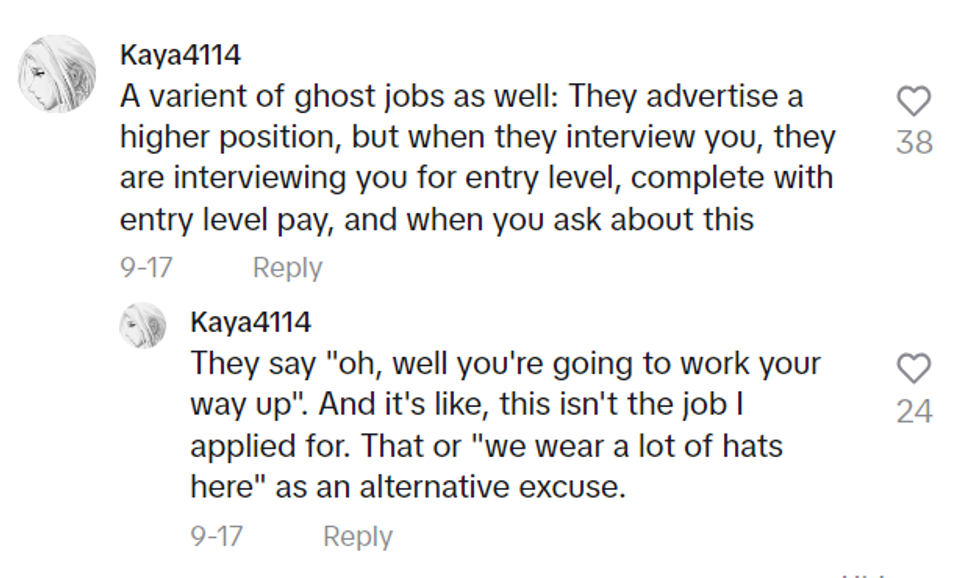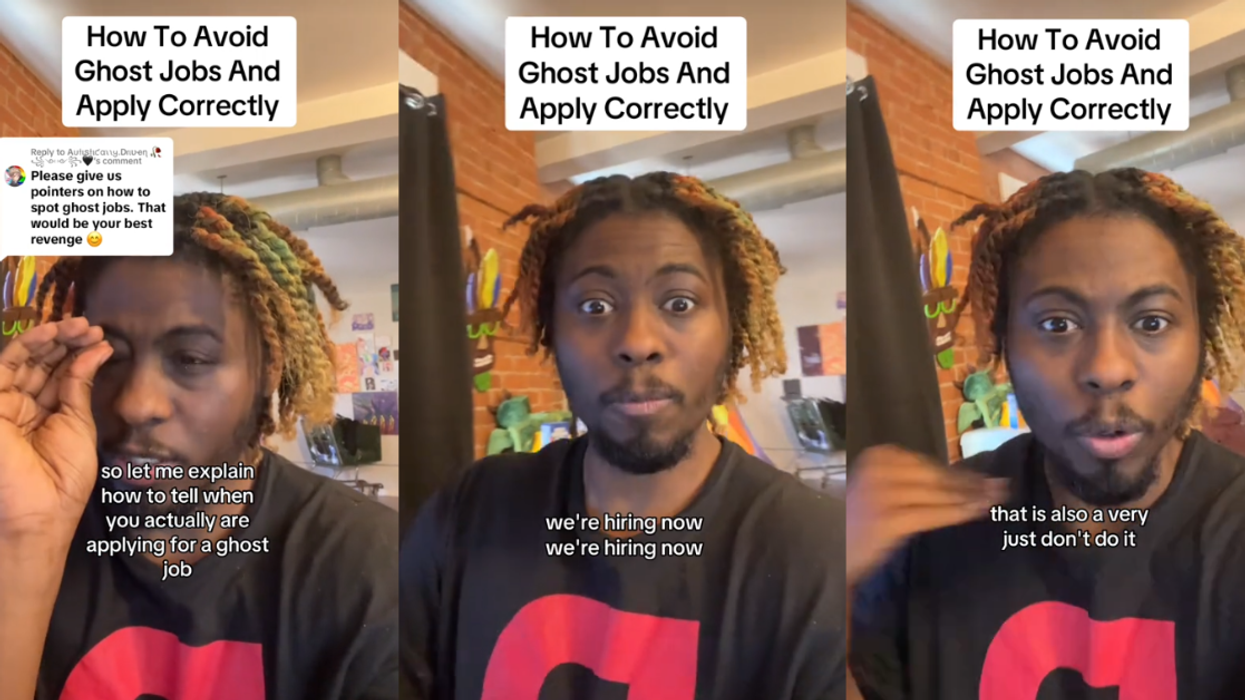Even though the unemployment rate in the United States is at an all-time low, people looking for a job or secondary work seem to be having a harder time than ever finding a job.
This largely seems to be due to incredibly high standard requirements on most job applications, a very low communication rate from most potential employers—and now "ghost jobs."
A "ghost job" is a job listing made by a company who has no intention to hire someone in that particular position.
The point of the listing is to put pressure on their current employees to work harder without a raise, and if their employee tries to apply for one of these higher-paying or higher-ranking positions, they'll likely be subject to a performance review and potentially a quiet firing or immediate firing.
While this is a problem for current employees at the company, this is also an issue for anyone looking for a job, because these listings are visible to the general public as well. So an unknowing person might put all of the effort into an application, not knowing that they'll never hear back, because the job doesn't actually exist.
Last month, TikToker and former hiring manager Ceros Whaley admitted that he used to make "a big bag" for posting these ghost job listings, among other responsibilities, and he eventually lost that job because he spoke up about feeling bad about listing fake jobs that were hurting employees' mental health and hindering the public's job application process.
You can watch that video here:
@ceroswhaley #fyp #storytime #job #foryou #viral
With a new fear unlocked, fellow TikTokers repeatedly asked Whaley if he could advise them on what to look for in a job application and if there was a way to discern a "ghost job" from a job listing that's actually worth spending time on.
Whaley obliged with a series of items to look for in a follow-up video.
The item Whaley was the most concerned about TikTokers paying attention to was the posting date.
"The posting date! The posting date is very important for telling [if a job listing is a] ghost job."
"If [the job listing] was posted four days ago, five days ago, there's a high chance you shouldn't click on that link."
"That's showing that, 'We're hiring now! We're hiring now! We're hiring now!'"
"And if it doesn't even have a time stamp, that is also a very [bad sign]; just don't do it."
The concern here about the posting date relates to urgency. If a company just posted the job and is urging candidates to apply immediately, that suggests an unhealthy amount of urgency, eagerness, and probably a high turnover rate.
That wouldn't be a good sign in any job opportunity, but if it's a ghost job, that urgency is meant to push current employees to work that much harder, that much faster.
The problem is that every job has to be posted initially, and with opportunity tracking software, sometimes we'll see a legitimate job listing very quickly after it's posted.
If the posting date is not enough of a clue, another item Whaley suggests thoroughly checking is the job description.
"Next, check the job description. The job description matters a lot when checking for a ghost job."
"If the job description is something insane, and I mean insane, where it doesn't really describe the job, that is also a way to tell when it is a ghost job. That is also a method used for that."
All job descriptions will have some vague language in them to leave room for the position to change with the new employee and the company in the future, and it's normal for candidates to have a few clarifying questions at the time of the interview.
But if an applicant reads a job description and can't really explain to themselves what they've just read or what responsibilities they'll have in that position, that could be a sign that it's a ghost job.
In that situation, the description was likely written with only current company employees in mind, who would be able to fill in the blanks and understand what the job description is meant to say, giving them room to feel stressed at work while leaving potential applicants in the dust.
Whaley also stresses the importance of cross-referencing the job posting with the company's website.
"You should also be cross-referencing the job description with what's listed on the company's website to make sure the company in itself is hiring."
"This happens, too, where they'll post a job listing on Indeed or some other job searching website, and they won't have it on the website. That's messed up, too."
This can be a great way to separate the ghost jobs from the real ones, because companies will maintain current career and job opportunities on their website, and if the item isn't listed there, it probably is a ghost job or was accidentally posted on Indeed or a similar platform.
You can watch the video here:
@ceroswhaley Replying to @Aυƚιʂƚιƈαʅʅყ.Dɾιʋҽɳ 🥀꧁༺༻꧂🖤 #fyp #jobs #manager #reply #replyingtocomments #viral
Some TikTokers chimed in with added tips for improving their job search results.





Others just found themselves more discouraged than ever before.





It's no secret that applying for jobs is harder than ever and that it can be seriously draining of a person's time, mental health, and sense of self-worth, especially when they've sent over 100 applications with no callbacks.
When all else fails, Whaley urges people to go back to actually calling the companies on the phone. Reaching out to hiring departments and tracking down the phone number for the manager who is specifically involved with the job you're seeking could make the difference between you getting that interview or not.
It's extra work, it takes extra time, but it might mean getting to leave the job hunt behind a whole lot sooner.








 The Benny Show
The Benny Show





 @neilforreal/Bluesky
@neilforreal/Bluesky @savannahcat/Bluesky
@savannahcat/Bluesky @qadishtujessica.inanna.app
@qadishtujessica.inanna.app @v-ron/Bluesky
@v-ron/Bluesky @nelnelnellie/Bluesky
@nelnelnellie/Bluesky @beatlenumber9/Bluesky
@beatlenumber9/Bluesky @pinkzombierose/Bluesky
@pinkzombierose/Bluesky
 @theunobsolete/TikTok
@theunobsolete/TikTok @theunobsolete/TikTok
@theunobsolete/TikTok @theunobsolete/TikTok
@theunobsolete/TikTok @theunobsolete/TikTok
@theunobsolete/TikTok @theunobsolete/TikTok
@theunobsolete/TikTok @theunobsolete/TikTok
@theunobsolete/TikTok @theunobsolete/TikTok
@theunobsolete/TikTok @theunobsolete/TikTok
@theunobsolete/TikTok @theunobsolete/TikTok
@theunobsolete/TikTok @theunobsolete/TikTok
@theunobsolete/TikTok @theunobsolete/TikTok
@theunobsolete/TikTok @theunobsolete/TikTok
@theunobsolete/TikTok @theunobsolete/TikTok
@theunobsolete/TikTok @theunobsolete/TikTok
@theunobsolete/TikTok @theunobsolete/TikTok
@theunobsolete/TikTok @theunobsolete/TikTok
@theunobsolete/TikTok @theunobsolete/TikTok
@theunobsolete/TikTok
 @laysuperstar/TikTok
@laysuperstar/TikTok @laysuperstar/TikTok
@laysuperstar/TikTok @laysuperstar/TikTok
@laysuperstar/TikTok @laysuperstar/TikTok
@laysuperstar/TikTok @laysuperstar/TikTok
@laysuperstar/TikTok @laysuperstar/TikTok
@laysuperstar/TikTok @laysuperstar/TikTok
@laysuperstar/TikTok @laysuperstar/TikTok
@laysuperstar/TikTok @laysuperstar/TikTok
@laysuperstar/TikTok @laysuperstar/TikTok
@laysuperstar/TikTok @laysuperstar/TikTok
@laysuperstar/TikTok @laysuperstar/TikTok
@laysuperstar/TikTok @laysuperstar/TikTok
@laysuperstar/TikTok @laysuperstar/TikTok
@laysuperstar/TikTok @laysuperstar/TikTok
@laysuperstar/TikTok